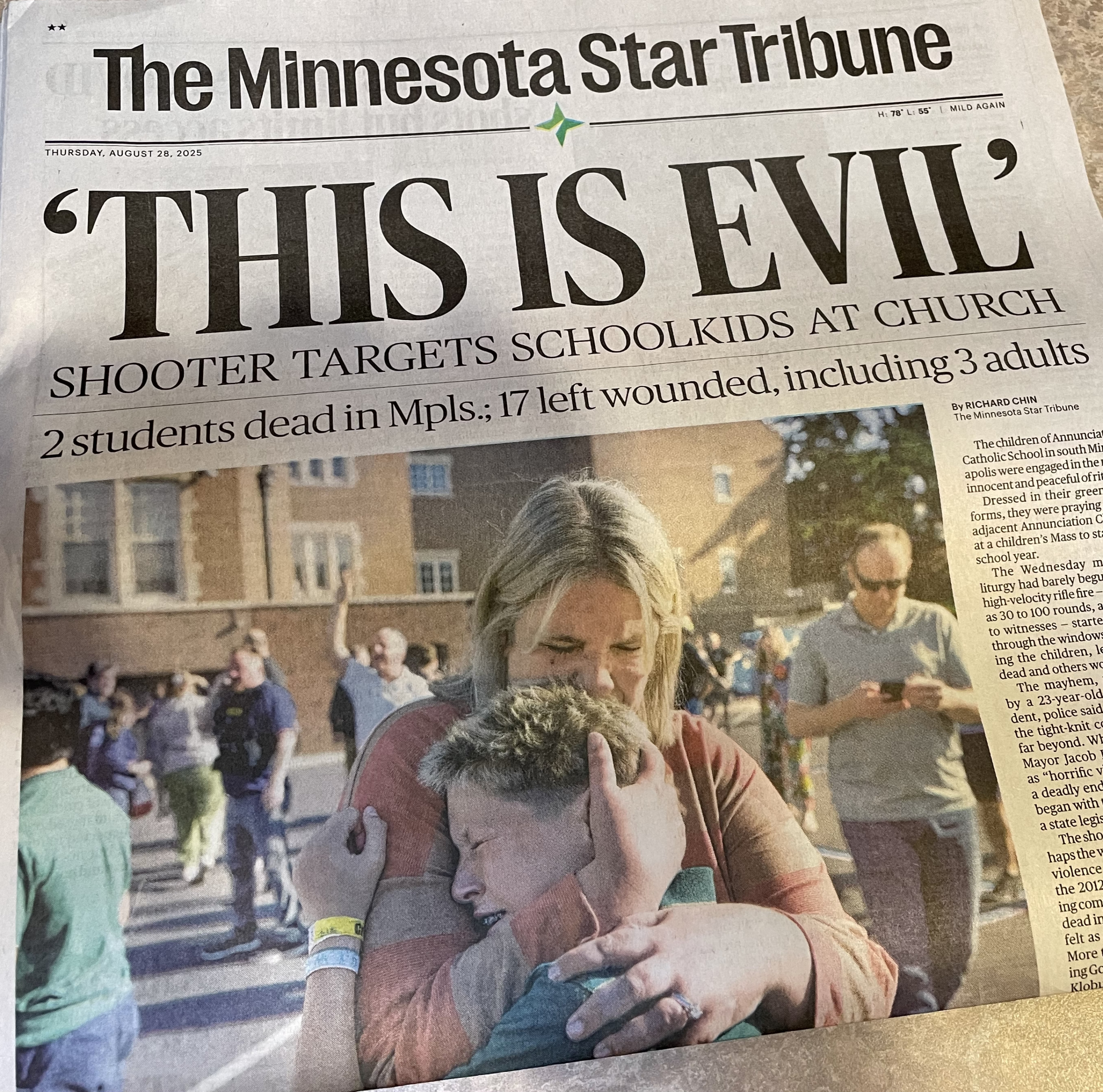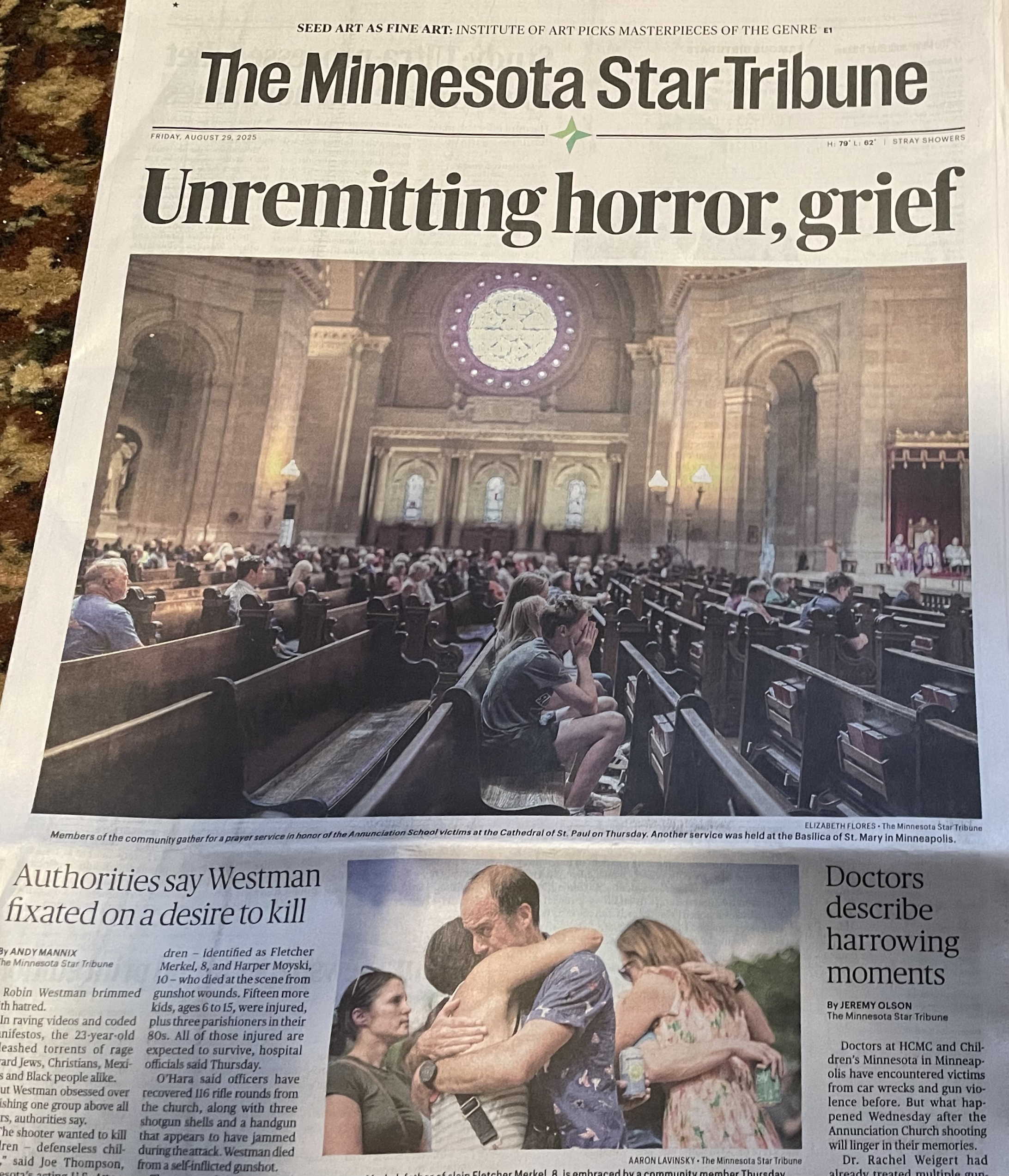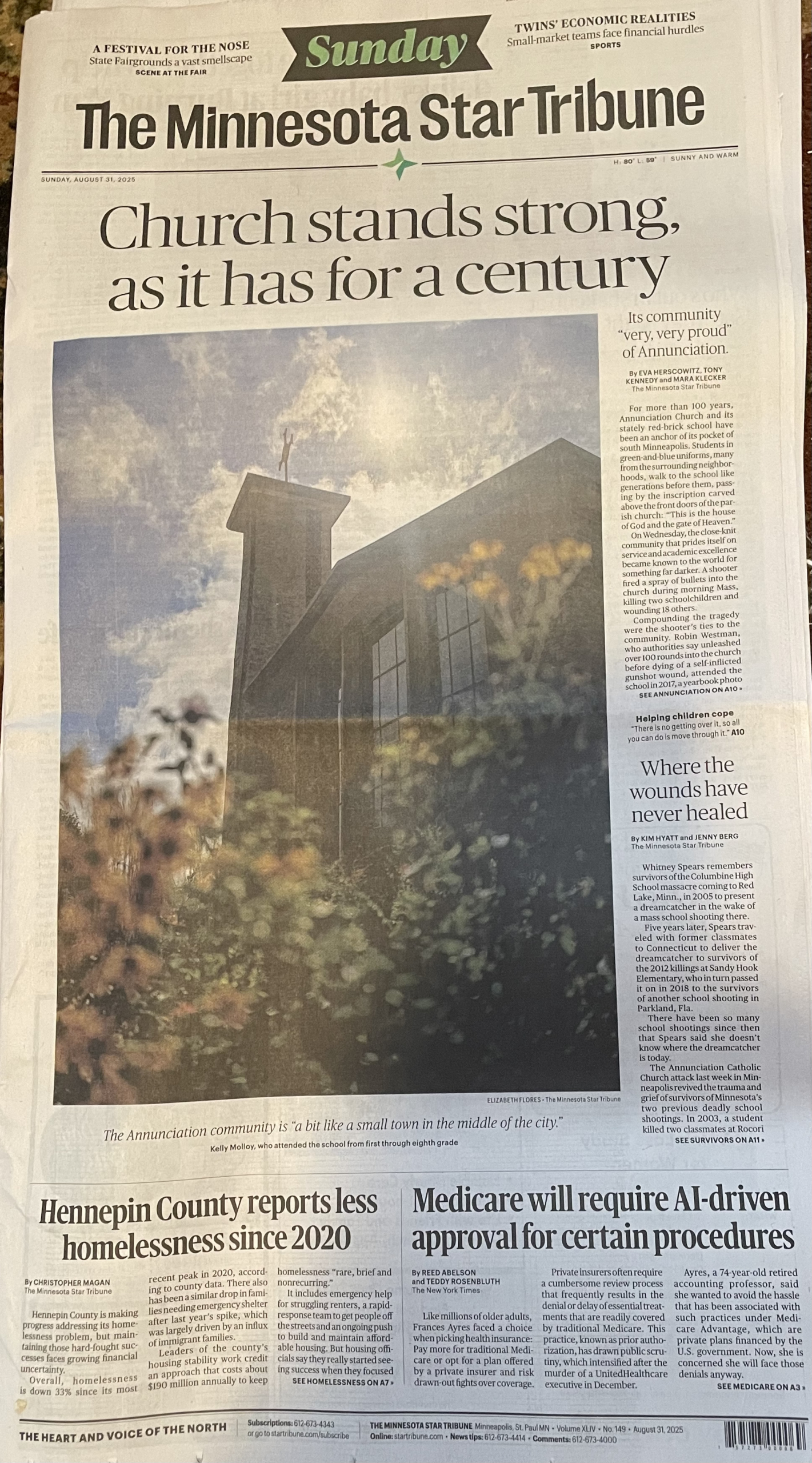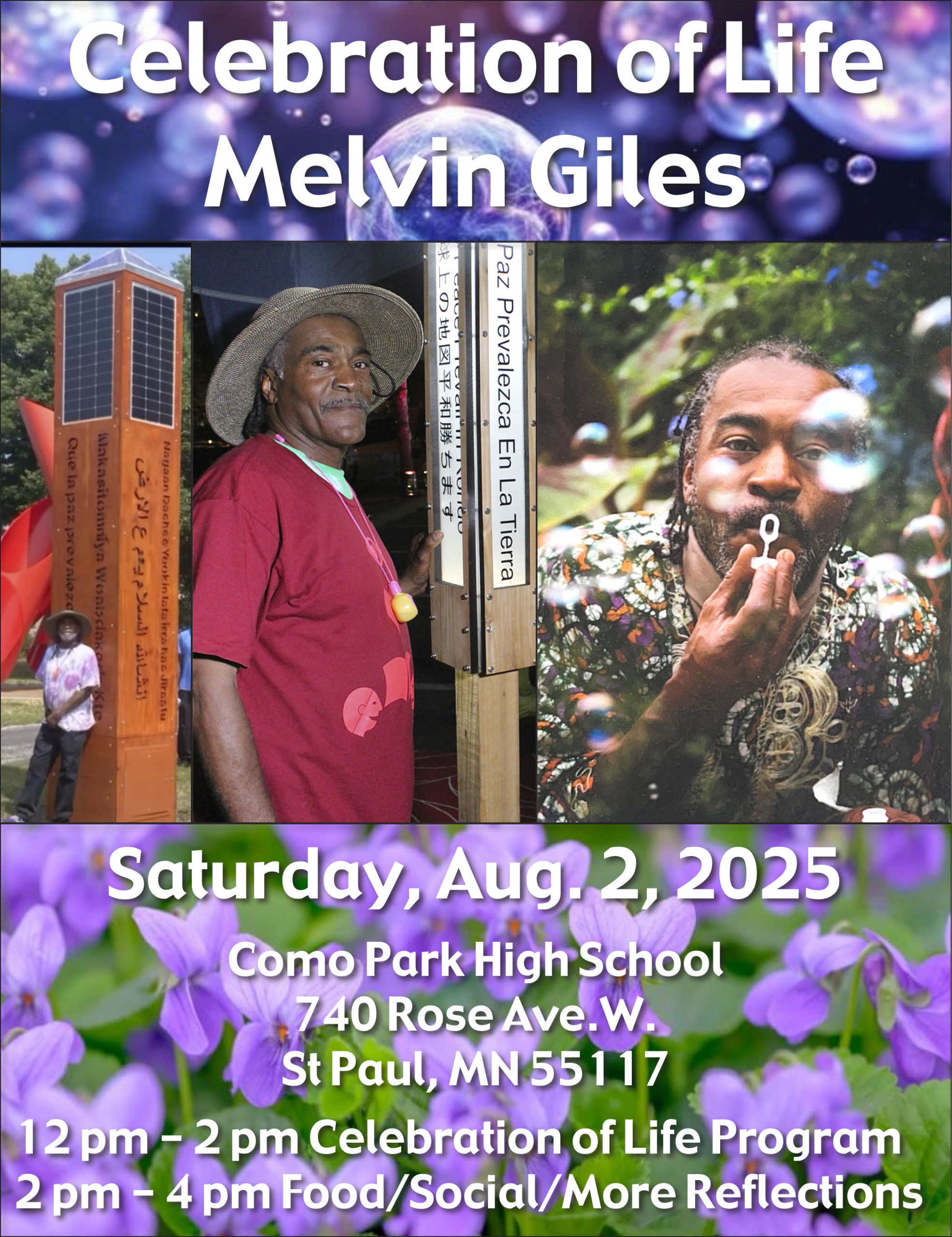The Days Ahead
People don’t like to hear bad news. The phrase “See no evil; speak no evil; hear no evil,” comes to mind. Unfortunately, bad news comes to us regardless, and it is important to pay attention. And we have seen months and now years of evidence of dangers to our democracy. In the end, we, the people, are accountable – all of us – if we choose to sit on the sidelines. This is most especially directed to the 75 million who voted for Harris/Walz in November, 2024. To ‘wash our hands’ of the present is to assure a future we will regret.
In the current day, when it comes to political conversation, people choose what they want to believe, and self-censor their own access to other opinions. It is a dangerous situation
Occasionally I come across thoughts that deserve the time, and following are some recent ones.
It up to you to choose to take the time to read and really think about how the present applies to you, personally, in these very troubled times.
The Big Picture for August 21st from Jay Kuo on “Sadopopulism and the Fascist MAGA ethos”
Robert Reich on August 7 wrote an insightful piece of “What you can do now“.
The Weekly Sift for August 25 gives some important inservice education.
Get in action.
August 26: Robert Reich on Trump’s Downfall; and his Sunday Thoughts August 31.
August 26, Heather Cox Richardson Letter from an American. Also August 28.
Wednesday, August 27, 2025, Annunciation: This morning a solitary killer murdered two young people at Mass at Annunciation Catholic Church in Minneapolis. Additionally there were 17 injured, most of whom were young students in their first week of the school year. Tonight was the first vigil, which I watched on TV. Flags around the country are at half staff. The story is newsworthy – but such stories have almost become commonplace. They are all tragedies, multiplied over and over and over in our country awash in guns, which makes killing so easy.
Ironically, the previous day, August 26, I met with my son, visiting from Littleton Co, and gave him two items of clothing to, in turn, give to his daughter, my granddaughter, Lindsay.
The gift was significant, even more so given what happened 24 hours later a few miles away at Annunciation Catholic Church. The items were the shirt and trousers I wore on a sad day in early May, 1999, when Lindsay, her parents, and I were among those who slowly walked up what had been dubbed “Cross Hill” overlooking nearby Columbine High School, erected in memory of those killed at Columbine in the massacre there a week or so earlier.
I was in Littleton by coincidence: weeks earlier. I had booked a stopover in Denver enroute home from hiking in Utah with a brother and sister. A few days before my flight to Utah from Minneapolis, first at a meeting, and then on my car radio, I first heard about the massacre at Columbine High School. I didn’t know where the school was or the details at first. It turned out to be about a mile from where my family lived. Lindsay, then a middle schooler, was 12.
Columbine was an unprecedented disaster 26 years ago. It seems to have become almost commonplace. The list of mass murders is now very long. [POSTNOTE August 30, 2025: as noted above, son Tom and family were near neighbors to the Columbine tragedy in April, 1999. On the ten year anniversary of Columbine, I reprinted Tom’s memories of that awful time period. You can read it here. The post is from April 20, 2009.]
Also yesterday came a photo of grandson Spencer, just promoted to Staff Sergeant in the U.S. Marines. Thirteen years ago – Dec 14, 2012 – I was at a suburban mall where Spencer’s Middle School Band was doing a concert. I think he was 8th grade at the time. Enroute home from that concert came another announcement on the car radio about another school massacre at Sandy Hook Elementary in Newtown CT.
Will we ever take action against largely unregulated weapons of war awash in todays United States? I don’t know. But I hope we keep trying to bring sanity back.
August 28, 2025: This mornings Minnesota Star Tribune front page is pretty clear.

Minnesota Star Tribune August 28, 2025
Leaving the Health Center after my morning walk today, the tune playing was the Bruce Springsteen anthem “Born in the USA”(1984). Listen to it. It has a lesson for citizens today. Let’s continue the conversation….
POSTNOTE August 29, 2025: Today’s Minnesota Star Tribune reported that the police “have recovered 116 rifle rounds from the church“, and that the death and injury count is now up to 20. The topic of Guns is no stranger to this blog: a search just now shows reference to “Guns” in 101 posts over the last 16 years.

Minnesota Star Tribune page 1 Aug. 29, 2025
POSTNOTE August 31, 2025: Today’s Minnesota Star Tribune was full of photos and commentary about Annunciation (see photo, below). The newspaper had commentary about a 2005 school shooting at Red Lake MN in 2005. I had written about this at the time and I still have it online, here.
This morning, at Basilica of St. Mary, my church, Fr. Gillespie handled the difficult topic very well. Here is how the Basilica’s website carried the story (see Fr. Griffith”s comments. here). Also, today, I got to thinking about the church response to 9-11-01, which I’d also written about at the time: Post 9-11-01001.

Minnesota Star Tribune August 31, 2025
POSTNOTE September 1, 2025: Over the years I have started to pay closest attention to the tone of the real conversation among real people in near proximity to me – such as at the coffee shop, or the people in church, or gatherings of any sort.
As I think about the people, generally (rather than the news as reported), I am noticing more of a quiet determination to make the world a better place, than to get mired in fear and loathing.
In the aftermath of 9-11-01, for instance, the national mood was revenge, pure and simple; Nineteen years later, in the wake of the George Floyd murder in Minneapolis, ordinary residents gathered to help clean up in the aftermath of the many fires set by as yet unknown provocateurs.
There is, I sense, a movement towards community, rather than towards more division. This is, I emphasize, only a feeling. But it is a feeling. I hope more build from it. We – all of us – are the future.
POSTNOTE September 6, 2025: There have been subsequent photos and stories in the local paper, but I decided to call a halt at September 1. I hope lots of people take up the issue with their legislators – that is where the solution has to begin. It will continue to be a very tough sell. People love their guns….
“Guns” have been part of over 100 posts at this space over the last 16 years.
If you looked back at them, you’d see a consistent set of talking points.
- I qualified as an expert marksman with the M-1 in Army days, 1962-63. But I have never owned or had a gun or in fact used a gun in all the years since.
- Getting rid of guns in this gun-ridden society is impossible. It is as difficult as it was to get rid of booze during prohibition days.
- It is easily possible to regulate guns through registration and other means, and stiffer penalties for violations. A minority of the citizenry owns a large percentage of the guns, especially the most lethal ones. Best I know from the Annunciation case, there was a single assailant who fired over 100 rounds in a very brief time period. There is absolutely no reason in a civil society for that kind of armament being allowed on the street.
- Having and using a gun to facilitate a crime is no guarantee of success. In the Annunciation case, the perpetrator apparently committed suicide. Those who survive their felony have almost zero chance of evading accountability.
- In my state, state legislators are probably the most crucial focus of lobbying, followed by other elected officials, local, state, national, who depend on being elected to hold office.
POSTNOTE September 7, 2025: My pastor, this morning, dealt with the issue in a brief and very effective way. Exactly what he said is not as important as that he said something. I am sure there were different pairs of ears hearing the message in their own way, but that makes no difference. In this case, silence is not golden.









 In summer 1965 we were, in a very real sense, poor. I had to leave my job, and move to a place I’d never been before, with no intention of ever being in Minneapolis. Life was a pretty frightening survival experience. Here are my recollections, written in 1981 for our son, of that time in
In summer 1965 we were, in a very real sense, poor. I had to leave my job, and move to a place I’d never been before, with no intention of ever being in Minneapolis. Life was a pretty frightening survival experience. Here are my recollections, written in 1981 for our son, of that time in 